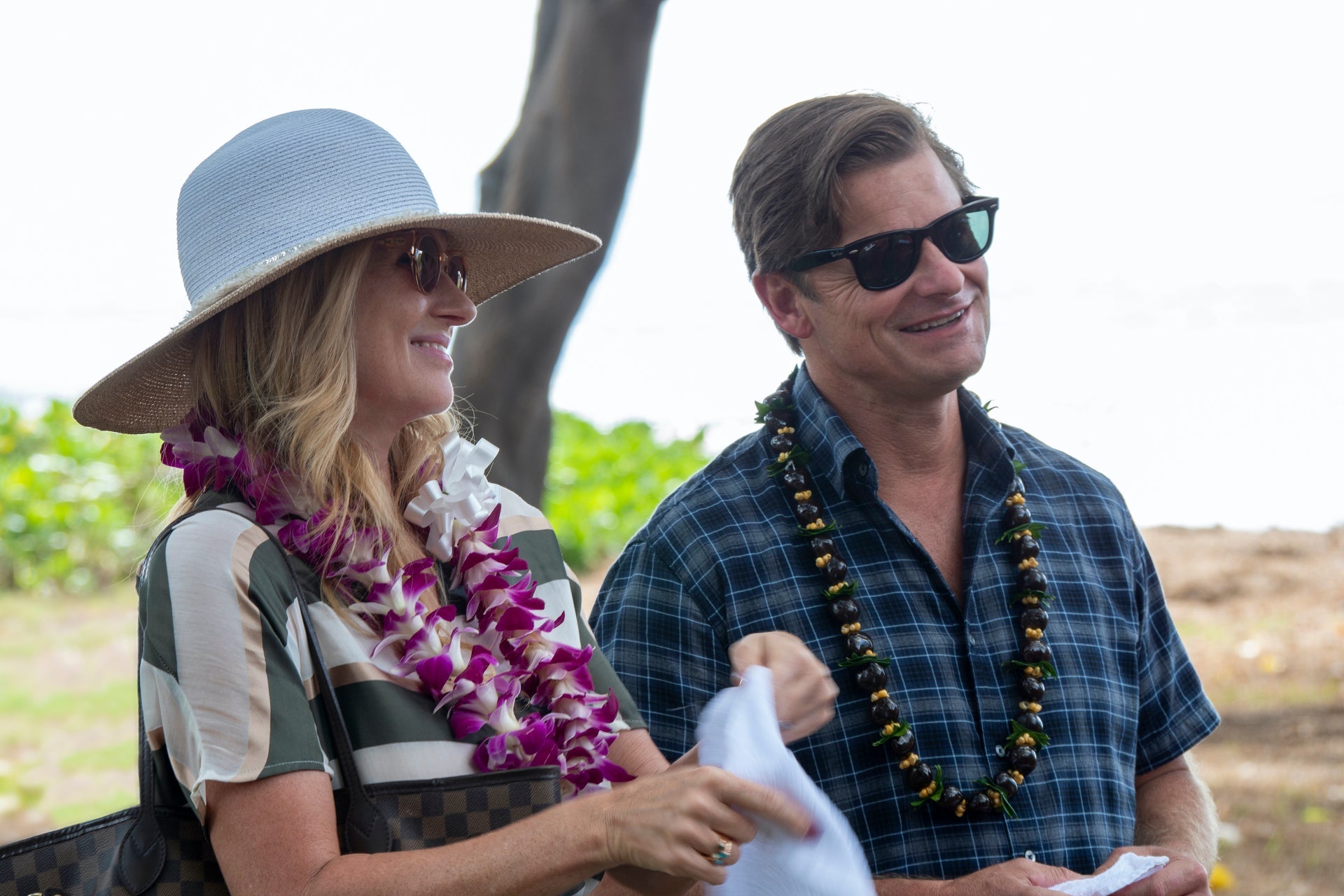In the opening minutes of Mike White’s The White Lotus, a bank of exorbitantly wealthy white people descend upon a Hawaiian resort. Their ambition is to be coddled and pampered, to relax and recharge, to do nothing but think about themselves while sitting by the pool for a week, and they expect to be aided and abetted in these pursuits by a helpful staff that aspires to blend in with the palm trees. The first encounter between the vacationers and the resorts’ employees takes place on a gorgeous bluff, as the 1 percenters disembark a yacht and are given their swanky room assignments. If it all seems very Upstairs, Downstairs by way of The Love Boat—a class-inflected, soapy satire set in paradise—any overlaps with colonial landings and the openings of a horror movie are also strictly intentional. This gorgeous paradise may lull visitors and viewers into a sense of false complacency, but the bodies will eventually start piling up.
Or, in The White Lotus’ case, the body. It is not a horror series, but as the show’s flash-forwarded opening sequence promises, there will be a corpse, and leading up to it, much bloodless class warfare. (White, who previously made HBO’s adored, but underwatched and eventually canceled Enlightened has surely observed that there is nothing on TV that gooses a miniseries’ ratings quite like a whodunit.) On the side of the grotesquely rich are the Mossbachers, a family of four with a guest in tow. The bread earner is Nicole (Connie Britton), a founder and CEO who reeks of lean-in feminism while espousing heartfelt concern for young white men’s foreclosed opportunities. She’s married to Mark (Steve Zahn), who is not nearly such a caricature, but is lost in his beta-husband identity. Olivia (Sydney Sweeney), their daughter, has brought along her college friend Paula (Brittany O’Grady). Paula isn’t white or nearly as rich as the Mossbachers, but she joins Olivia in ice-cold eye rolling when she’s not canoodling with one of the staffers. Meanwhile, their son, Quinn (Fred Hechinger), is sweet, awkward, masturbating, and fixated on his phone.
The other guests include Jennifer Coolidge’s Tanya McQuoid, who arrives with her mother’s ashes and a whole lot of emotional baggage and becomes an emotional succubus on Belinda (Natasha Rothwell), the soothing spa manager who has a knack for helping white ladies but wants more.* And then there are the newlyweds, Rachel (Alexandra Daddario), who has married into money and is just realizing what that means, and Shane, played by an incandescently unbearable Jake Lacy, an entitled man baby who engages in a series of ever-escalating conflicts with the resort’s tightly wound manager, Armond (Murray Bartlett), who begins to unspool.
Initially, the satire on The White Lotus laps in like the waves: deceptively gentle. White’s last HBO series was Enlightened, a cult favorite starring Laura Dern as abrasive dreamer Amy Jellicoe, and he’s adept at observing his protagonists with a kind of sympathetic objectivity, their flaws and strengths backlit. (Britton’s Nicole, the most like Amy Jellicoe on paper, is also the character the series is least interested in: She only ever gets her one note.) Coolidge’s Tanya, for example, uses money to buy the emotional support she genuinely needs: She’s appreciative and myopic, a mess who makes one everywhere she goes. A revelation about his own father pushes Zahn’s Mark to try and tell the truth of his own life, which leads to a number of wildly inappropriate, if bizarrely well-meant disclosures about his marriage. The series does have its favorites—Quinn and Belinda are almost entirely sympathetic—while Lacy’s Shane is its villain.
As the characters bump into one another in the first few episodes, there’s a chewiness to the social interactions that calls to mind Succession on Vacation, the kind of show that would lend itself to detailed recaps about the subtextual power dynamics in every interaction. But as the show goes on, it exposes its deterministic backbone. The characters are caught up in an inexorable class dialectic and as the series unfolds , preordained to make certain moves—which, not for nothing, is also what happens in a tragedy.
By the end of the six-episode miniseries, the farce is still ongoing, but the joke is thinking that things could have turned out any other way. Fates were always sealed. The myopically entitled uberrich have gotten the vacation they wanted thanks to the pain and suffering of the employees, and the two guests inhabiting a middle ground—i.e., not there on their own bankroll—have only succeeded in making things worse. It’s only the rich who can float through life untouched, insulated not only from consequences but from self-knowledge or the desire to make things more equitable. They don’t need to be on vacation to exist in a bubble.
Where The White Lotus ends up is, in some ways, the slyest joke of all. The Love Boat with class tensions, a smart summer soap, is fundamentally fatalist—and less riotously, a bit didactic. Still I wonder if The White Lotus’ indictment of class and race privilege doesn’t lose a bit of its bite from the company it keeps. Succession, Big Little Lies, The Undoing, Gossip Girl, Made for Love: The HBO lineup is currently abundant with dramas about extremely rich, miserable white people. But is eviscerating them not just another way to stay slavishly fixated? It’s time HBO got interested in another kind of guest.
Correction, July 12, 2021: This post originally misspelled Jennifer Coolidge’s first name.
